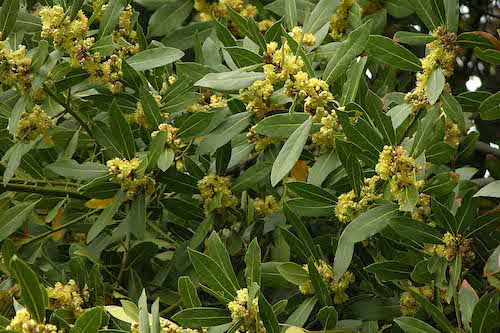(Flowering bay laurel tree)
September is the month to make sauce from the last tomatoes in your garden. Though this year most tomato bushes are long gone because of the unusual long and hot summer. There already are tomatoes from Holland in Athenian supermarkets and here on the island they now come from Turkey. Then you’d better open tinned tomato sauce, made with sun kissed tomatoes. Tomatoes from Holland have never seen the sun and those from Turkey also come from glass houses.
Forgotten figs on the trees lie drying on the earth, bunches of grapes hollowed by wasps hang moribund on their branches, the vegetable garden is now only a piteous collection of dried plants. But you still might find a lonely little paprika or a last leaflet of basil.
A herb or vegetable garden would not be complete without a bay laurel tree (Laurus nobilis), that throughout the year can provide a leaf for a tomato sauce or any other dish that just gets better with the bitter sweet taste of a bay leaf.
A laurel tree is modest. Using laurel leaves, you do not need much. The flowers of the laurel are not sensational, nor are its berries striking. The tree can only live a hundred years and does not reach an exciting size. Besides its vital role in the kitchen and a small contribution to the medical world it does have a coulourful and important history.
It is thanks to the Olympian God Apollo that this tree exists. Or thanks to the God of Love Eros, depending on how you look at it. According to the Roman poet Ovid, Apollo, master in archery, killed the huge dragonlike snake Python at Delphi with a thousand arrows. Above the body he built the famous sanctuary of Delphi and it also became the start for the Pythian Games, the most popular games after the Olympics (that along with those for sports gave prizes for music and dance.)
Apollo was very proud of this achievement and he was a bit patronizing towards the tiny Eros who with his small arrows could never have slaughtered such a nasty monster. Eros felt offended, flew to Mount Parnassus and from its top directed a golden arrow towards Apollo and a leaden arrow towards the beautiful nymph Daphne. He hit them both. When Apollo and Daphne met troubles started: Apollo had fallen desperately in love, but Daphne, poisoned by the lead, didn’t want to even speak to this nasty man, mighty god or not. A game of cat and mice followed, which Daphne might easily have lost. She called her father Peneus for help. To protect her the river god changed his desperate daughter into a laurel tree (dendro daphnis in Greek).
Apollo never gave up his love: he promised the tree eternal youth, causing its leaves to remain green all year long and he vowed that branches would be made into wreaths that would crown the heads of kings and winners of festivals. During the later Roman Empire, these then still horseshoe-shaped crowns adorned many an emperor’s head, like that of Julius Cesar (forever immortalized in the comic books of Asterix and Obelix). Laurel wreaths have always remained popular in the arts.
In the north of Lesvos, around Sykaminia and Argenos, you will still find small woods with plenty of laurel trees, having the typical scent of an uplifting bitterness. I associate this scent with the making of fig syrup outdoors where branches of laurel are used in the enormous kettle as well as in the fire, leaving this sweet incense hanging in the autumnal air, as it once did in Delphi.
Apollo was also the god of the oracles and when Daphne transformed into a laurel, the tree was introduced to the sanctuary of Delphi, where the temple was cleansed by the smoke of burning laurel branches and where the priestess chewed on laurel leaves, to enter into a trance in order to communicate with the gods and thus allowing the oracle to speak. Scientists however believe that the laurel from those ancient times was a poisonous kind. When you now chew on a laurel leaf, you will not get poisoned nor enter a trance and you can forget about a conversation with the gods.
Nowadays the oracles have been replaced by scientists who also warn the people of coming catastrophes. The oracles were sacred in ancient times, but laureate scientists and other laureates have to scream bloody murder in order to get heard. I guess there still is a lot to learn from the ancient Greeks.











